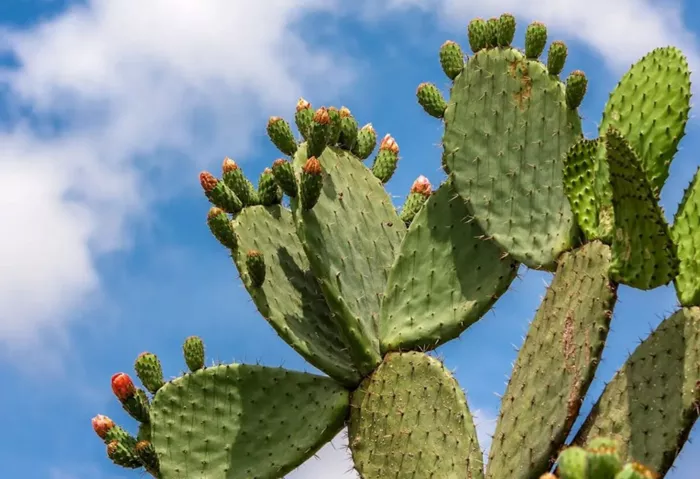Prof. Zvi Mendel, an entomologist at the Volcani Center Agricultural Research Organization, may not be a huge fan of the prickly pear cactus, or “sabra,” but he has spent over a decade working tirelessly to save it. His efforts have been crucial in protecting Israel’s sabra plants from a destructive parasitic insect that arrived from Lebanon in 2013.
The pest, known as the false carmine cochineal (Dactylopius opuntiae), poses a serious threat to sabra cacti worldwide. In Morocco, it has already destroyed around 150,000 hectares of prickly pear crops, resulting in the loss of jobs for thousands and the closure of seed oil factories.
The sabra cactus holds special significance in Israel. Though native to Mexico, it has become a symbol of Israeli identity—prickly on the outside, but sweet and soft within. If the plant had been wiped out, it would have been a blow to the national image.
Beyond its cultural importance, the sabra is a valuable cash crop. It is rich in fiber, antioxidants, and known for aiding in diabetes and cholesterol management. It also serves as animal feed and is used in various industrial products.
“It’s an excellent and versatile plant,” says Mendel. “It can withstand extreme temperatures and thrive with low-quality water.”
However, the cochineal scale insects threaten to wipe out this crucial plant. The pest feeds on cacti and causes them to wither and die. Its spread began in southern Lebanon and quickly moved into Syria, Jordan, and Cyprus, causing severe damage along the way. The first infestation in Israel was reported in 2013 in the Upper Galilee.
Mendel and his team, in collaboration with the Keren Kayemeth LeIsrael-Jewish National Fund (KKL-JNF), quickly realized that spraying the plants with pesticides was ineffective and harmful to the environment. They sought a more sustainable solution.
“The cactus didn’t have natural predators in Israel, so it was particularly vulnerable,” Mendel explains. The answer, he concluded, was to introduce the cactus’s natural predator: a ladybeetle from Mexico that feeds on the cochineal.
In 2016, Mendel’s team released the first ladybeetles into Israel, but initial efforts faced setbacks. The beetles often arrived too late, after the plants had already been severely damaged. To speed up the process, Mendel enlisted the help of the public, encouraging people to collect and spread the beetles to new infestation hotspots.
By 2019, a new strategy was adopted. The team transported infected plants, where both cochineal and beetles were present, to new areas to help establish healthy beetle populations. This method helped to control the pest and reduce the damage.
Mendel’s work didn’t stop at Israel’s borders. His team’s success in Israel positively impacted neighboring countries like Lebanon, Syria, and Jordan, where the beetles spread naturally. Mendel also focused on preventing the spread of the disease into Gaza, where the cactus is important to local agriculture.
Sharing their findings with the global community, Mendel and his team translated their research into Arabic, English, and French. They also provided guidelines on how to rear and release the beetles, offering support to countries facing similar challenges.
Morocco, suffering from the same pest, initially declined Israel’s offer to send beetles. However, when the situation worsened, a private company in Agadir reached out to Mendel for assistance. He agreed to send the beetles, provided they were reared without charge.
“Morocco has likely reduced its losses, but it came too late,” Mendel notes.
While Israel’s outbreak is under control, other countries remain at risk. The pest has spread to Spain, Algeria, and Tunisia, and Sicily, a major supplier of prickly pear fruits to Italy, is now in danger. Mendel is closely monitoring the situation in these regions.
In addition to his work with sabras, Mendel has helped save Israel’s eucalyptus trees from a similar pest, demonstrating his long-standing commitment to environmental conservation. Though he retired nine years ago, at 76, he remains the go-to expert for anyone facing cactus infestations.
“We’ve helped so many people in a short time,” Mendel says. “The global response has been overwhelming. This success is the result of teamwork, and I couldn’t have done it alone.”
With Israel’s sabra cactus now largely under control, Mendel’s team continues to monitor and manage the spread, confident that their methods will help protect this valuable plant for years to come.
Related topics:
- Helen Chesnut: Self-Sown Plants Often Grow Larger Than the Original Planting
- Zordi Harnesses AI and Robotics to Cultivate Flavorful Strawberries Indoors
- Canberra Nursery Unveils a New Plant Discovery


